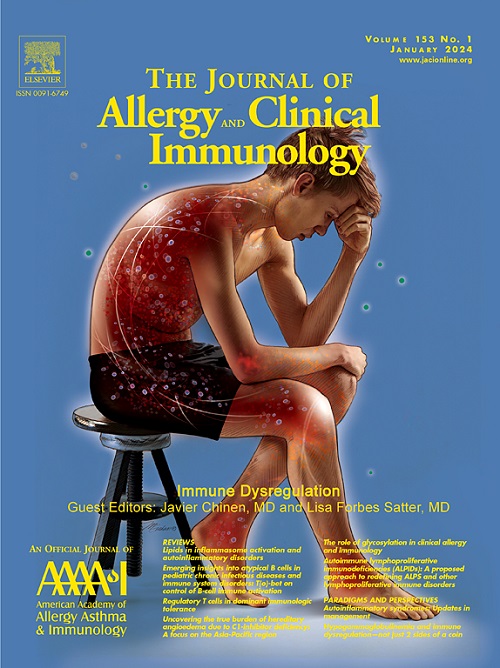Thymic and T-cell intrinsic critical roles associated with severe combined immunodeficiency and Omenn syndrome due to a heterozygous variant (G201R) in PSMB10
IF 11.4
1区 医学
Q1 ALLERGY
引用次数: 0
Abstract
Background
Heterozygous immunoproteasome 20 S subunit beta 10 (PSMB10) mutations can cause severe combined immunodeficiency and Omenn syndrome. Hematopoietic stem cell transplantation in these patients is associated with severe complications and poor immune reconstitution, often resulting in death.
Objective
We sought to perform immunologic and molecular characterization of an infant with a PSMB10 heterozygous variant.
Methods
A heterozygous variant in PSMB10 (p.G201R) was identified in the index patient but not her parents. Detailed immunophenotyping and functional studies, including flow cytometry, immunoblotting, and T-cell development in artificial thymic organoids, were performed.
Results
The patient presented with severe B-, natural killer–, and T-cell lymphopenia, with a progressive increase in memory CD4+ T cells and loss of CD8+ T cells, diminished Vbeta family diversity, and abnormal IL-7 signaling. Immunoproteasome protein expression (PSMB9 and PSMB10) was markedly reduced in the patient’s cells, including PBMCs, EBV-transformed B cells, and fibroblasts, the mutation likely acting in a dominant-negative fashion. The patient’s CD34+ cells showed a normal early T-cell development but slightly impaired generation of CD3+TCR αβ+ cells in artificial thymic organoids, and human thymus single-cell RNA sequencing demonstrated that PSMB10 is expressed in different subsets of cortical and medullary thymic epithelial cells. Collectively, these data indicate that PSMB10 mutations affect positive selection of CD8 T cells, generation of a diverse T-cell repertoire, and negative selection of autoreactive T cells.
Conclusions
The PSMB10 G201R variant is associated with reduced immunoproteasome expression levels that appear to play vital roles in hematopoietic and extrahematopoietic immune system development and function. PSMB10-associated thymoproteasome dysfunction leads to impaired thymopoiesis and the development of severe combined immunodeficiency and Omenn syndrome, suggesting possible benefit from thymus implantation.
PSMB10杂合变异(G201R)导致的胸腺和t细胞内在关键作用与严重联合免疫缺陷和Omenn综合征相关
背景:杂合性免疫蛋白酶体亚单位β - 10型(PSMB10)突变可引起严重的联合免疫缺陷(SCID)和Omenn综合征(OS)。这些患者的造血干细胞移植伴有严重的并发症和较差的免疫重建,往往导致死亡。目的:研究1例婴儿PSMB10杂合变异的免疫学和分子特征。方法:PSMB10的杂合变异(p.G201R)在该指数中发现,而在其亲本中未发现。进行了详细的免疫表型和功能研究,包括流式细胞术、免疫印迹和人工胸腺类器官(ATO)的t细胞发育。结果:患者表现为严重的B-、NK-和t细胞淋巴减少,记忆性CD4+进行性增加,CD8+ t细胞丢失,Vbeta家族多样性降低,IL-7信号异常。免疫蛋白酶体蛋白表达(PSMB10和9)在患者细胞中显著降低,包括pbmc、ebv转化的B细胞和成纤维细胞,突变可能以显性阴性方式起作用。患者CD34+细胞显示正常的早期t细胞发育,但ATO中CD3+TCRαβ+细胞的生成略有受损,人胸腺单细胞RNA测序显示PSMB10在胸腺皮质和髓质上皮细胞的不同亚群中表达。总的来说,这些数据表明PSMB10突变影响CD8 t细胞的阳性选择,多种t细胞库的产生,以及自身反应性t细胞的阴性选择。结论:PSMB10 G201R变异与免疫蛋白酶体表达水平降低相关,免疫蛋白酶体表达水平在造血和造血外免疫系统发育和功能中发挥重要作用。psmb10相关的胸腺蛋白酶体功能障碍可导致胸腺功能受损和SCID和OS的发展,提示胸腺植入可能有益。
本文章由计算机程序翻译,如有差异,请以英文原文为准。
求助全文
约1分钟内获得全文
求助全文
来源期刊
CiteScore
25.90
自引率
7.70%
发文量
1302
审稿时长
38 days
期刊介绍:
The Journal of Allergy and Clinical Immunology is a prestigious publication that features groundbreaking research in the fields of Allergy, Asthma, and Immunology. This influential journal publishes high-impact research papers that explore various topics, including asthma, food allergy, allergic rhinitis, atopic dermatitis, primary immune deficiencies, occupational and environmental allergy, and other allergic and immunologic diseases. The articles not only report on clinical trials and mechanistic studies but also provide insights into novel therapies, underlying mechanisms, and important discoveries that contribute to our understanding of these diseases. By sharing this valuable information, the journal aims to enhance the diagnosis and management of patients in the future.

 求助内容:
求助内容: 应助结果提醒方式:
应助结果提醒方式:


